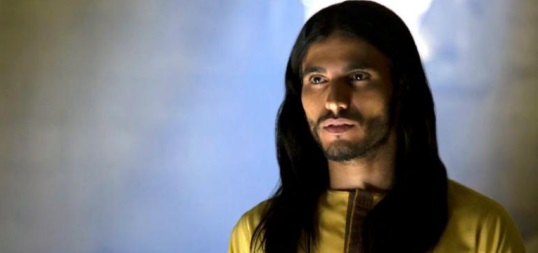Necessarily the very best of intentions are claimed for a streaming wannabe epic whose central character can call up dust storms in Syria, tornadoes in Texas and out-of-the blue tidal surges in Florida – and won’t be in the least disturbed by the prospect of torture-to-death in Israel or rendition or worse by the CIA when he gets to Washington DC. How he might also be a Russian cat’s paw against the West or just a savvy far-left Western political disruptor we aren’t allowed to know yet: by far the greatest disaster that could befall Netflix is that a project as resource-hungry as this would need to be cancelled after just one ‘season’ – for lack of enigma or loose ends.
The likelihood of at least one more season of ‘Messiah’ is in itself a kind of miracle, I guess. The jury is out on whether anyone’s life will be changed for the better by this enterprise – but who should care if the explosions and natural disasters, padded out with ‘wisdom talk’, keep coming?
Far be it from me, however, to claim that the hours spent watching ‘Messiah’ have been entirely wasted. In fact I believe I can now better understand why Jesus’s first coming long preceded the onset of global rolling TV news, why he did not lead an endless middle-eastern caravan to Jerusalem or Rome, and why he would not want to distract the current incumbent of the Oval Office – when that poor man has already been pushed close to thrombosis by Greta Thunberg, honest US diplomats and his own House of Representatives.
To explain that last point, why is the US president in ‘Messiah’ a conscientious and even shy Latter-Day Saint who will seriously consider pulling back all US overseas military forces and will obviously never even think of sitting up in bed at 4 a.m. to insult someone on Twitter? Did the show-runner (i.e. big boss) for ‘Messiah’ see a need to prevent a Trumpian president from seizing the limelight – e.g. by proposing in the situation room that a drone should fire a small nuke at this Socialist Antichrist in the Syrian desert, before he can even think of going to Texas?
I am making a serious point here, I hope: for me the Gospels are a complete indictment of the cult of celebrity, and of the narcissism of those who seek it. Far from setting out to make himself the central focus of global attention in his own time – as this Netflix messiah clearly does – Jesus taught on the smallest scale, to the least educated. He fled from any attempt to make himself the totemic leader of a political movement bent on regime-change, and insisted upon the greater importance of the poorest. His miracles were always a response to the faith of sufferers, never a bid to overawe the faithless. He died obscurely too, as the Roman literature of his own time attests by never mentioning him.
Clearly he knew long before Lord Acton that power – as Netflix understands it – corrupts. Its ‘Messiah’ needs to bone up on Acton, and to meditate a little further upon Jesus’s first coming.
Most important, Jesus insisted that only if he himself departed could ‘the counsellor’ come to advise his sincere followers, wherever they would be. By contrast, this Netflix messiah has clearly decided that the Holy Spirit of counsel has flunked out: everyone now needs to sit up and listen to him, the bearded and enigmatic one, via global media – and watch him walk on water at the Lincoln memorial. So much for the daft proposition that the verbal wisdoms and ‘special effects’ of such a phenomenon could now unite all of the Abrahamic traditions and pacify the world. The ‘teachings’ that pad out the spectacle in this production could never overpower the drawing power of those special effects or the episodic cliff hangers that every such TV production must depend upon. Adrenaline and grace are entirely different things, and the former is not conducive to insight, calm or memory. Game of Thrones did indeed travel far on adrenaline – but far too far. Because cinematic script-writing about warfare is far less educative and exhausting than real warfare, it ended in deep disappointment: not a good omen for ‘Messiah’.
It is clear that Jesus saw instead a need to assure the very poorest of their own dearness and nearness to an always-present ‘World Spirit’ of God. His short ministry showed even the downside of making any human individual a focus for the fascination of others, as Jesus’s closest disciples proved on the road to Jerusalem. We humans will jostle even for the seat next to any supposed Messiah – and build yet another abusive hierarchy of dignity out of that. It was exactly that jostling that led to the current crisis of the Catholic papacy and the church.
But that in turn laid a foundation for a Franciscan papacy, for a pope who could demystify ‘holiness’ and be persuasive of the miraculous power of tenderness and humility. It is for all of us together now to save the world, guided by the same World Spirit who led Jesus to humble himself. There can be no spectacular second coming of Jesus until we have all lost the desire to jostle for a global spotlight and for the nearest seat to God.
Sensible people will prefer to believe that Jesus is already here, observing us kindly, without ‘letting on’ – in the next seat in the bus. They know that the Trinity are already equidistant from all of us, and will make their home within us – if we simply ask.
Sean O’Conaill, 28/01/2020
